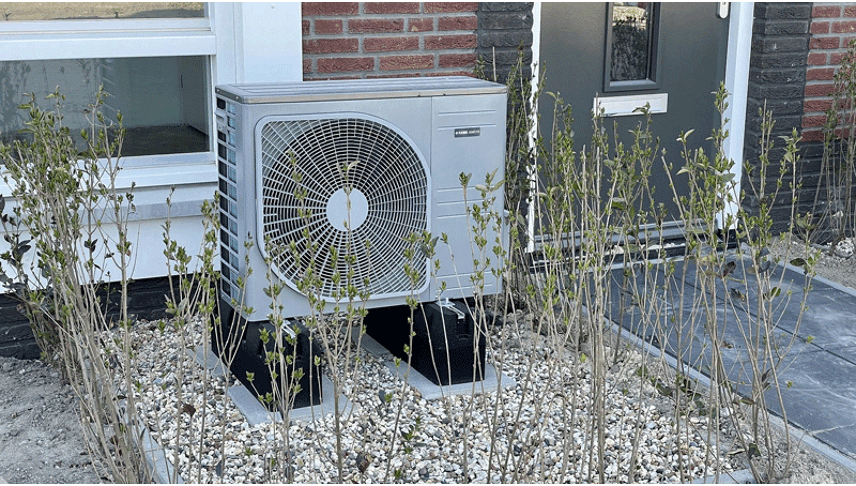Register for free and continue reading
Join our growing army of changemakers and get unlimited access to our premium content

Pictured: A home fitted with a heat pump
The PAC exists to assess whether government spending is efficient and, this week, it has raised multiple concerns over Ministers’ approach to using public funding and leveraging private investment to cut emissions from home heating.
Heat pumps will play a key role. While the Government has increased the level of grant funding which families can claim towards the upfront cost of a heat pump to £7,500, the PAC has warned that most homes will still need to find an extra £4,100.
Another key barrier to uptake is the running costs associated with heat pumps. The Government promised, under Boris Johnson, to rebalance electricity and gas wholesale costs. However, this workstream has been delayed. The PAC wants Ministers to properly assess this by the end of January 2025.
Also slowing heat pump uptake is the lack of a single source of information and advice on heat pump installation. Compounded by evolving consumer protection rules, policy chopping and changing and the proliferation of misinformation, this means customers are often confused by complexity. An easy-to-use Government website should be set up as a priority, the PAC recommends. It should include clear information on which properties are suitable for a heat pump, the likely cost savings and the correct process for contracting a reputable installer.
The Government is targeting 600,000 annual heat pump installations by 2028, up from around 55,000 in 2022. The PAC’s report is one of many warning that the policy infrastructure is not in place to credibly achieve this goal.
Beyond the consumer engagement issues discussed above, the report calls on Ministers to take a more ambitious and joined-up approach to growing the nation’s stock of qualified heat pump installers. The Heat Pump Association estimates that there will need to be 33,700 trained heat pump installers by 2028 to meet the target.
The PAC also implores the Government to fix issues with the quality of data used to measure progress against the 2028 target. It currently relies on heat pump sale data and the uptake of government grants. The PAC wants the data collection mechanism to be improved by the end of the year, and quarterly updates provided in 2025.
The Department for Energy Security and Net-Zero (DESNZ) has been unable to comment on the report officially, due to Prime Minister Rishi Sunak’s recent calling of a General Election.
The hydrogen question
It is becoming increasingly clear that the Government is not counting on hydrogen doing the heavy lifting in decarbonising heating.
A statement from DESNZ earlier this month confirmed that hydrogen “may have a role to play”, but that this will be limited to “some locations” and will not be rolled out as rapidly as anticipated pre-pandemic.
The statement was issued to confirm an indefinite delay to a town-scale trial of 100% hydrogen home heating. Both planned village-scale trials had already been scrapped prior, due to local opposition. The decision on the location of the town had already been delayed for more than a year.
The new PAC report warns that an “absence of evidence” from trials is “creating uncertainty for industry”, preventing concerted planning and investments.
The PAC wants the Government to clarify its updated approach to trials and whether this will impact its ability to make an evidence-based strategic decision on the role of hydrogen in heating in 2026, as originally promised.
It also believes that, by the end of next June, DESNZ should set out how it will undertake any required decommissioning of gas networks, including how this process will be funded. The Committee is concerned that costs could be passed onto the taxpayer in an unsustainable way without a well-managed transition.
Related article: UK Government ‘not properly discussing’ wind-down of gas networks as heat goes electric


Politicians and consumers love simplicity. Engineers and architects know it is not that simple. An energy assessor can explain how to boost your current EPC rating, if you bother to ask before they start, and perhaps afterwards.
Dismissing H2 before you even know the costs (it will likely be cheaper than fusion or fission)is scientifically weak. Asking non-expert consumers if they think a H2 trial isa good idea is pretty daft. That’s a bit like asking a patient if they like the idea of losing their hair – you need to explain the pros and cons.
Basic heat networks on ‘the continent’ have long moved beyond simple boilers and pipes to hybrid systems using waste heat from industry and adapting the heat generation technology to suit the demand.
My ideal heat source would be a shared ground source loop with an internal WSHP offering heating and cooling.
If that isn’t available (and it can be done in villages as well as towns and cities) then a hybrid HP/boiler combo with PV and a heat store is the way to go. Look at the technology in cars and ask yourself how your house or workplace compares. Life stopped being simple a long time ago. As did living well enough on £100 a week.